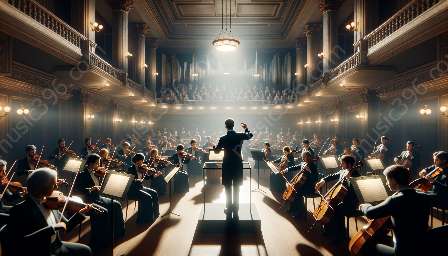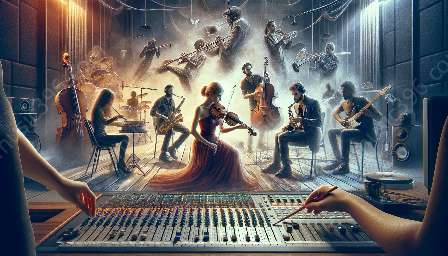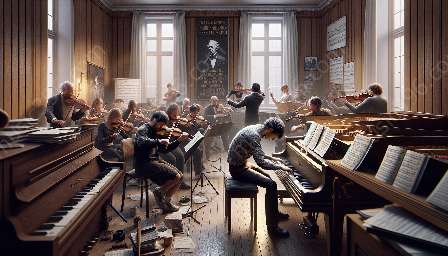Conducting and orchestration in classical music require a unique set of skills, including leadership and communication. Conductors play a vital role in leading orchestras and ensembles, and their ability to effectively communicate and lead is essential for producing a cohesive and high-quality musical performance. In this topic cluster, we will delve into how conductors develop and refine their leadership and communication skills, emphasizing the importance of these skills in the context of classical music.
The Role of Conductors in Classical Music
Before delving into the development of leadership and communication skills, it's essential to understand the role of conductors in the world of classical music. Conductors are responsible for interpreting musical scores, guiding musicians through rehearsals, shaping the overall performance, and ensuring that the artistic vision of the composer is realized. They act as the bridge between the composer's intentions and the musicians' execution, making their role pivotal in the creation of music.
Leadership in Conducting
Leadership is a fundamental aspect of conducting, as conductors are tasked with leading a group of talented and often independent-minded musicians. Effective leadership in conducting involves not only technical expertise in interpreting scores and directing tempo, dynamics, and articulation but also the ability to inspire and motivate the musicians to give their best performance. Conductors must possess strong leadership qualities such as decisiveness, confidence, empathy, and the ability to foster a collaborative and respectful environment within the ensemble.
Developing Leadership Skills
Conductors develop their leadership skills through a combination of formal education, practical experience, and personal growth. Formal education often encompasses studying conducting techniques, music theory, and score analysis. Additionally, aspiring conductors may benefit from mentorship and masterclasses with experienced conductors who can provide valuable insights and guidance. Practical experience, including leading rehearsals and conducting performances, allows conductors to apply their knowledge in real-world settings, honing their leadership abilities.
Refining Leadership Skills
Refining leadership skills is an ongoing process for conductors. Self-reflection, feedback from mentors and musicians, and continuous study of musical repertoire contribute to the refinement of leadership capabilities. Conductors often seek opportunities to work with various ensembles and orchestras, gaining exposure to diverse musical styles and honing their adaptability as leaders. Additionally, refining communication skills is integral to enhancing leadership, as effective communication fosters understanding, trust, and unity within an ensemble.
Communication Skills in Conducting
Communication is at the core of effective conducting. Conductors must convey their interpretations and vision to the musicians clearly and persuasively. Additionally, they need to facilitate open and respectful communication within the ensemble, fostering a collaborative atmosphere where musicians feel valued and understood. Strong communication skills enable conductors to articulate musical concepts, provide constructive feedback, and inspire musicians to express themselves through their instruments.
Developing Communication Skills
Developing communication skills involves mastering verbal and nonverbal communication techniques. Conductors refine their ability to convey musical ideas and emotions through gestures, facial expressions, and body language. They also study rhetoric and public speaking to enhance their verbal communication skills, learning to articulate their interpretations and provide direction effectively. Furthermore, active listening and empathy play a crucial role in understanding the perspectives and needs of individual musicians, contributing to effective communication.
Refining Communication Skills
Continual refinement of communication skills is imperative for conductors. They engage in ongoing dialogue with musicians, seeking feedback and insights to enhance their communicative effectiveness. Additionally, conductors may participate in workshops and training programs focused on interpersonal communication and leadership, learning methods to foster a supportive and communicative environment within the ensemble. Self-awareness and adaptability are key aspects of refining communication skills, allowing conductors to tailor their communication style to different musical settings and individual musicians.
The Intersection of Leadership and Communication Skills
For conductors, leadership and communication skills are interconnected and mutually reinforcing. Effective leadership hinges on clear and persuasive communication, while strong communication fosters trust and cooperation, essential components of effective leadership. The synergy between these skills enables conductors to guide orchestras and ensembles with clarity, conviction, and empathy, resulting in cohesive and impactful musical performances.
Conclusion
Developing and refining leadership and communication skills is a continuous journey for conductors in the realm of classical music. As they hone their abilities to lead and communicate effectively, conductors enrich their capacity to inspire, guide, and collaborate with musicians, ultimately shaping memorable and transformative musical experiences.

































